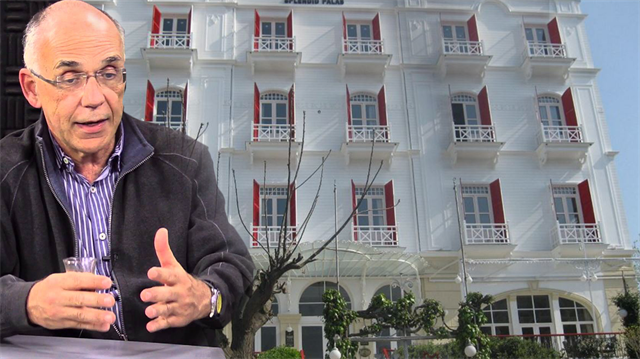
As more evidence surfaces daily, it will be evident that the Central Intelligence Agency (CIA) was playing a huge role behind the July 15 coup attempt in Turkey
Henri J. Barkey, former CIA personnel and the current Director of the Middle East Program at the Woodrow Wilson International Center for Scholars, known as the policy maker for U.S. authority, was the second top American figure who orchestrated the coup attempt in Turkey.
According to Istanbul Police's Intelligence, Counter Terror, Cyber Crime and Criminal Units, Barkey was holding a meeting with 17 top figures, most of them foreign nationals, at a hotel on Istanbul's Princes Island on July 15, the day of the failed coup attempt in Turkey.
Barkey was staying in the Splendid Hotel, which was used as a British Military Headquarters during the days of occupation in 1919, between July 15 and 17.
According to the hotel management, Barkey had held a meeting that lasted hours in a special room.
“Barkey and his entourage had been holding a meeting 'till the morning on July 16 in a special room. They have been following the coup attempt over TV channels," the hotel personnel told police.
They said that Barkey welcomed the attendees of the meeting, most of them either foreign policy analysists or academicians, in groups of two or three persons at the hotel entrance.
After receiving all guests, they went into a special room and held the “secret" meeting, according to police.
Meanwhile, Barkey also told the hotel management, “I will make a live interview with CNN International at 4 p.m. and with Voice of America at 6 p.m.," requesting them to arrange “all necessary infrastructure."
Barkey was accused of making several telephone conversations on the coup night.
The police units, who launched a search operation in the hotel, said Barkey was carrying an ex-model cell phone void of internet connection technology, as well as a laptop and smart phone.
Police are investigating the “log" registrations of internet connections and computers of the hotel.
CCTV footage of the hotel, roads and the island's piers are also being investigated.
The coup attempt on July 15, which has been foiled by popular resistance, was organized by a group of Fetullah Terrorist Organization (FETÖ) members who infiltrated the Turkey's military.
Fetullah Gülen, the U.S.-based leader of FETÖ who has been working with the CIA for several years to design Turkey's political arena, was the mastermind of the coup attempt and Turkey demands his extradition from the U.S.
In early statements, the U.S. repeated denied Turkey's allegations and rejected the extradition request. And now, the U.S. authority is trying to protect him by indicating to form an international commission rather going through direct legal process.
Following the failed coup attempt, millions of Turkish nationals, regardless of their religious identity, political views and ethnic background, are standing united against the coup plotters as well as FETÖ terror group.
All political parties voiced their solidarity with the government and urged the U.S. to extradite Gülen and support Turkey's legal process against coup plotters.
Main squares and streets across the country are filled with people from every age and parts of the society, as they continue celebrating in the evenings the victory of Turkish democracy for the 11th day.
But Barkey tried to cast a shadow on the victory of Turkish people, government and democracy.
“This is a coup attempt where you have no winners. Everybody loses, including the government that survived it," he told the American National Public Radio (NPR) at 3.30 a.m. local time on July 16 from Istanbul.
He also accused that Turkey would be enter in a more chaotic environment though the country entered into a more strong and more democratic environment.
“But I will submit to you that this president [Erdoğan] has been weakened much more now. Even though he will probably have extra constitutional powers, he's weakened, because the face that he projected of an impregnable confident leader is now not there anymore. So he's will be looking over his shoulder all the time. He's going to be less trusting. He already was not trusting of the opposition. I suspect that relations will become much tenser in Turkey, and he will not be able to govern with consensus. Instead, he's going to be governing more and more by dictate, and that is..." he said.
Barkey, an academic from Pennsylvania University, is widely known in Turkey with his book “Turkey's Kurdish Question," which he prepared with former CIA vice chairman, Graham Fuller.
Fuller is also known for his unfaltering support to Gülen and his organization, for he requested the U.S. authority not to extradite Gülen to Turkey.
Barkey has been toiling on recent developments in Turkey and the Middle East. He met PKK terror leader Abdullah Öcalan in Italy and suggested him to stay there before being arrested by Turkey's authority.
His wife Elen Barkey has been working in a high position in the CIA for several years.
Hello, the comments you share on our site are a valuable resource for other users. Please respect other users and different opinions. Do not use rude, offensive, derogatory, or discriminatory language.
The floor is all yours.












